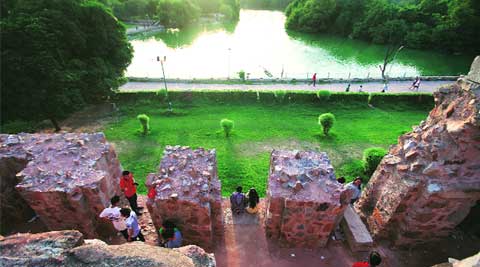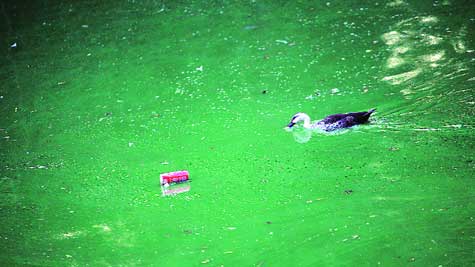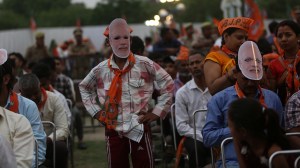- India
- International
Capital’s lakes & ponds stare at a ‘watery grave’, govt readies lifeline
Under a public-private partnership project, govt plans to revive 10 water bodies. An MoU with NGOs is likely next week.
 Revival of the Hauz Khas lake will be taken up under the project. (Source: Express photo by Oinam Anand)
Revival of the Hauz Khas lake will be taken up under the project. (Source: Express photo by Oinam Anand)
The Delhi Development Authority (DDA) is responsible for 63 water bodies in the capital. Most of these lakes and ponds are, however, dying. In an effort aimed at saving them, the DDA recently drew up a list of 10 important water bodies, which will be revived under a public-private partnership (PPP) project.
For the project, the DDA has sought the assistance of NGOs to help revive the water bodies, recharge the depleting watertable and turn the areas around these lakes and ponds into recreation spots. “We will sign a memorandum of understanding with three NGOs by next week and, to begin with, 10 water bodies will be revived under the public-private partnership scheme,” DDA Vice-Chairman Balvinder Kumar said.
The Hauz Khas lake, Shamsi Talab in Mehrauli and Bhalswa lake are among the first ones to be taken up under the scheme. The Braj Foundation and INTACH are among the three NGOs which have been shortlisted as of now, an official said.
Officials said the NGOs were asked to select the water bodies they want to revive and, accordingly, the 10 water bodies have been shortlisted.
“For each water body, a memorandum of association (MoA) would be signed. These agencies will maintain the water bodies as well as generate funds from corporate houses and international agencies for the revival, conservation and maintenance efforts. The DDA will be a partner in the development and conservation process,” an official said.

Earlier, the DDA had shortlisted four agencies, which have expertise in conserving water bodies. For instance, the Braj Foundation has in the past revived water bodies and lakes in Mathura and Vrindavan. Another shortlisted NGO, Samarthya, has experience in maintenance of lakes in Krizkod, Kerala.
Rajneesh Kapur of Braj Foundation said they wanted to revive both the lake at Hauz Khas village and the Satpullah dam. “Efforts to maintain and clean the Hauz Khas lake by previous authorities have been lacklustre. While concretisation has taken place, it has not always been done in a scientific manner. The Satpullah dam in Saket is in dire need of desilting,” he said.
“After DDA’s legal department examines various aspects of the MoU, the detailed project report for the entire exercise will be prepared, following which we will be looking at corporate donations to fund the project,” Kapur said.
Other agencies include Forum for Organised Resources Conservation and Enhancement (FORCE), which has been associated with reviving the Hauz Khas lake in the past, and the Indian National Trust for Art and Cultural Heritage (INTACH), which has been providing consultancy for revival of the Hauz Khas and Sanjay lakes, among others.
“We are still waiting for the DDA to revert back to us with regard to the project,” an INTACH official said.
Expression of Interest was invited by the DDA in April from NGOs and self-help groups, which have experience in reviving and maintaining water bodies. Under the terms and conditions, a minimum of five years’ experience in reviving water bodies is needed.
Moreover, the NGO should have the technical staff required for execution of the task, besides having knowledge of hydrology/
irrigation engineering etc.
Real estate, construction debris threaten Dheerpur marshlands
 City’s water bodies face threat from developers. (Source: Express photo)
City’s water bodies face threat from developers. (Source: Express photo)
The Dheerpur marshes in Delhi are waging a battle many water bodies in Delhi have already lost against construction debris, reclamation of land for real estate projects and governmental apathy.
Among the many projects which are choking the capital’s last natural marshland is a Delhi Police residential complex, which was given environmental clearance recently by the State Environment Impact Assessment Authority.
After advocate Gaurav Bansal filed a plea before the National Green Tribunal (NGT) over the marshland, the tribunal restrained the release of any sewage or sludge in and around water bodies in Dheerpur. The NGT also directed the Ministry of Environment and Forests along with the Delhi government to identify and assess the status of wetlands in the capital. It also directed them to submit a plan for their conservation.
The DDA had decided to change the land use of the marshland at Dheerpur in December 2012 and, in a public notice, had announced the change in land use of 19.33 acres from ‘recreational’ (16.63 acres) and ‘river and water body’ (2.70 acres) to ‘residential’ to meet the needs of Delhi Police residences.
The plea before the NGT adds that the marshlands at Dheerpur are constantly threatened by a number of real estate projects that have come up in the area, while the construction debris from these projects — including the Delhi Police residential complex — are choking the fragile marshland ecosystem by blocking the flow of water.
Experts said the loss of catchment area had to be dealt with urgently in order for any agency to reclaim these water bodies. “Water bodies are natural repositories for rainwater. But with construction and encroachment along water bodies, water from rain stops flowing into the lake or pond and it eventually starts drying up,” Ravi Aggarwal of NGO Toxics Link said.
As per the Indian National Trust for Art and Cultural Heritage, maps dating back to 1936 show several marshy areas to the west of Yamuna and, according to these maps, the Dheerpur marshland was a part of the Jahangirpuri marshland — most of which has been destroyed over the years.
Apr 25: Latest News
- 01
- 02
- 03
- 04
- 05







































